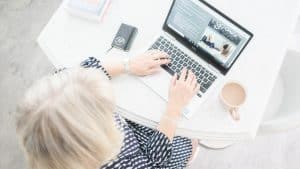
Remote working through this pandemic has seen many of us working in close quarters with partners, children and pets whilst trying to get work done, leading to challenges that are affecting our Wellbeing.
More and more small businesses are working from home as a means of operating the necessary social distancing and are developing plans for working from home beyond the pandemic.
With this transition taking place for many of us it is important to be both physically and mentally in shape to maintain an optimal Wellbeing.
Feeling disconnected from our colleagues can leave some of us struggling and our usual level of productivity effected.
Working remotely isn’t all bad – in fact many of us prefer to work remotely which makes us happier and in turn are finding that we are being more productive during the challenges that the global pandemic have bought.
The stigma associated with working from home prior to COVID-19 has disappeared. And working remotely is now extremely common, though often under very difficult conditions.
Here are some helpful tips that you may want to consider…
Workspace
Whilst you may want to sit on the sofa with one eye on the TV, your remote workspace still requires a set up that aims to look after you. Consider your desk surface – does it give support to your laptops and other equipment you are using. Once you have a supportive desk, a chair set at the appropriate height and that is comfortable will minimise neck and back pain which can over time cause back complaints and effect your Wellbeing. Take a moment to look around you – adding a pop of colour on what may be dull walls, bringing a plant into your room to connect with nature or opening a window occasionally can make a big difference to how you feel.
Flexible Routine
You might consider it important to stay flexible when it comes to your fitness but do you think about yourself when working at home? Whilst it is important to have a work routine when working remotely, being flexible with your routine and breaking your day with a short walk, pop in a load of washing or get the vacuum out can be an important break in maintaining your Wellbeing. The human body is not designed to sit for long periods of time and in our normal office environment you are more likely to move around, so explore ways you can move around your home and build in the odd break. Taking short breaks can improve your focus and productivity.
Consider meetings
Many of us are finding ourselves in back to back meetings all day which doesn’t allow time to debrief, reflect or prepare for the next virtual meeting and can have an effect on our Wellbeing and productivity. Whether you’re the meeting facilitator or an attendee, consider how many of your meetings are really essential or could they be shortened by ten minutes to allow for the all-important break to get some fresh air or walk around.
Communication
Are you connecting with colleagues or others regularly? Whilst working remotely, you can sometimes forget to connect, however technology now allows us to engage pretty much anywhere through messaging, calls or video conferencing. Making time for yourself and others to engage promotes participation and conversation that helps combat isolation that you or your colleagues maybe feeling. Explore what works for you – being on video conferences all day may become overwhelming where a telephone call may allow you to walk around and be away from your desk.
Choose your task
Many of us are often tempted to put off the hardest job until later or the end of the day. Procrastination can create undue stress and often means that when you finally do the task it may not be your best work. Commit yourself to taking on the hardest job at the beginning of the day and reap the rewards of your achievements throughout the day. Other jobs will be easy in comparison!
Look after yourself
If you’re anything like me, at times it’s been easy to “throw in the towel” to those healthy habits you’d adopted previously. Good habits of eating healthily and taking regular exercise contribute to your mental health too. Regular exercise for just 20-30 mins a day will boost our brains with the chemicals (serotonin/endorphins) we need to make us happy which in turn will reduce our anxiety levels. Consider the foods you are having and when you have them – monitoring if and when you feel a dip in energy levels. Adjusting this can aid your self-care and boost your Wellbeing.
Taking a moment to consider these tips and maybe adopting a few of them could be the positive move you need to maintain your optimal Wellbeing. If you’d like any more tips or want to explore some short or longer term support, do let me know kathryn@kathrynjacksoncoaching.co.uk
